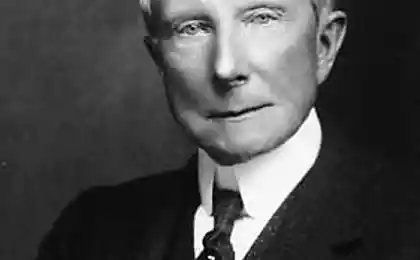449
John Mcworter: Where to look for causes of events

© Joseph Coniff
Linguist and cultural commentator John Macwhorter a large part of phenomena in society explain the things that preceded the emergence of this phenomenon, and it's annoying modern habit to look for the causes of events in the present, not the past. Essay on how English has become the most popular language in the world, why SMS and Twitter are irrelevant to the crisis of written language and how it turned out, that nobody has not come up with the keyboard and convenience of letters.
In a perfect world all people suddenly realize that what political scientists call a dependence on the previous development, explains the world much better than it looks. This concept can be explained as follows: often, what today seems normal or inevitable, began with a choice that was reasonable at a particular point in time. Despite the fact that after a while this choice may seem very strange, the established order doesn't change, because external factors do not allow to go back and try the other alternatives.
An example of this phenomenon is the seemingly illogical arrangement of letters on the keyboard of a typewriter. Why not just have the letters in alphabetical order or arrange them so that the most frequently used letters were under the strong fingers? Actually, the first typewriters with too quick letters print hit, so its inventor deliberately came up with the location where the letter a falls under the ungainly little finger. In addition, in the first row were all the letters of the word typewriter (the typewriter) to the sellers, unfamiliar with the technique of printing, could not delay to enter the word.
"I often dream that people suddenly lit up and they were able to prevent the possibility that phenomena can be explained by the dependence on previous development — that is no worse than a hastily cobbled together conclusions suggested by the present. Even the idea that the present rests on the strange and bizarre foundations of the previous conditions is much more interesting than to believe that all we have is a harsh present."Soon, however, mechanical improvements made it possible to more quickly seal, was presented to the new keyboard with the letters arranged depending on the frequency of their use. But it was too late: there was no way back. By 1890, typists across America are accustomed to the QWERTY keyboard and shoals of the new version, which was difficult to adjust to. Retraining typists would cost dearly and, in fact, was unnecessary. So QWERTY was passed on from generation to generation, and even today we use this strange configuration on the computers where the indents buttons are mechanically impossible.
The basic concept is simple, but the overall effect of this theory is evaluated only through such "funny" stories — without explanation mass of scientific and historical processes. Instead, all naturally tend to look for causes of current phenomena in modern conditions.
We can assume that cats bury their waste out of fastidiousness, although we all know that the same thing is with pleasure that consumes its own vomit, and then jumps on your lap. This burying — feline instinct from the wild times, then it helps not to attract predators, and fortunately for pet owners, there's no reason to get rid of this habit now.
I often dream that people suddenly lit up, and they were able to prevent the possibility that phenomena can be explained by the dependence on previous development, which is no worse than a hastily cobbled together conclusions suggested by the present. Even the idea that the present is based on strange and bizarre foundations of the previous conditions is much more interesting than to believe that all we have is now (mostly), and the story is just "the past", which interestingly only the fact that something can be repeated again.
For example, dependence on previous development explains a lot about the language, though many have the habit to explain linguistic traditions that "just so happened". A huge part of the community jumped at the idea, which is about as possible to explain the formation of thinking in the language. For example, writer Robert markram calls the English language the most "effective" because of the small number of suffixes, which make most European languages. He believes that the reason for the lack of suffixes in the spirit of native speakers, and that has brought them to first place in the world through research and the industrial revolution.
But the suffixes of the English began to disappear from the VIII century ad when the Vikings invaded Britain. Many of them had not fully learned the language, and their children began to speak as well. After this it is impossible to create the kind and the combination of air — there is no way back, until gradually the morphology is not restored for infinitely long time. And also a real fixed-syntax English has nothing to do with any modern state of mind, nor even with any spirit — even four centuries ago. The blame for the dependence on previous development — as in most phenomena of language structure.
"American English began a rapid change from a pampered to a less formal "conversational" style in the sixties, at the height of the cultural revolution. This shift has had a direct impact on the preparation of textbooks on the art of language, the degree to which any young man has been influenced by old-fashioned formal speech, and the relationship to the heritage of the English language as a whole."Lately we hear a lot about the crisis of written language — presumably because the e-mail and text messages. But why don't people write e-mails to the same "writing" style, which for centuries has honed a classic of the epistolary genre? Or are we talking about some effects of television (which is unclear) to a new generation: despite the fact that children of the fifties indefinitely stuck in front of the TV — long before loud statements about teleoperate for the first time reached such a scale, as described in the report "a Nation at risk".
The real explanation is unconvincing, while based on earlier historical development — completely. American English began a rapid change from a pampered to a less formal "conversational" style in the sixties, at the height of the cultural revolution. This shift has had a direct impact on the preparation of textbooks on the art of language, the degree to which any young man has been influenced by old-fashioned formal speech, and the relationship to the heritage of the English language in General. The result: the language and culture with an emphasis on concise, lapidary, spontaneous. After just one generation — there was no turning back. Anyone who has decided to speak pompously, looked absurd and deprived of any respect. The theory of dependence on previous development suggests that this cultural shift was the reason that scared, happy, or just interests us in how English is currently used, and thus makes the influence of television, email and other technologies side effect.published
Source: theoryandpractice.ru























